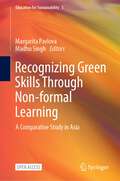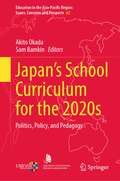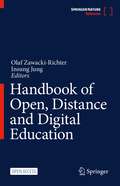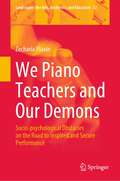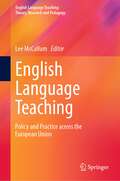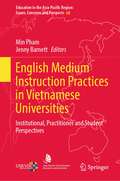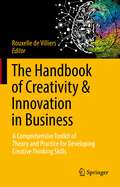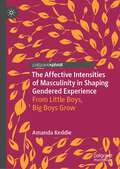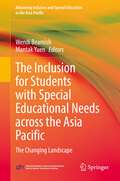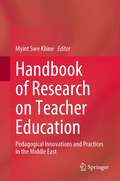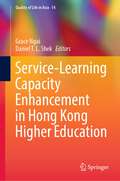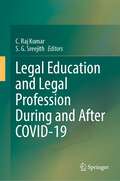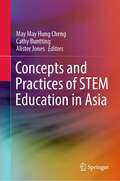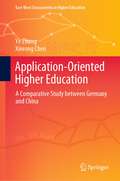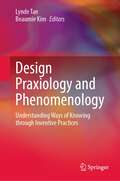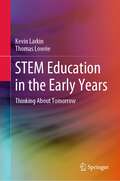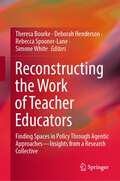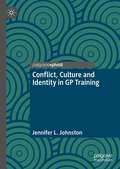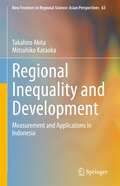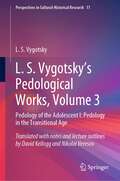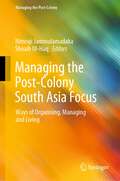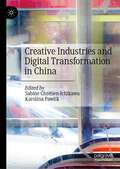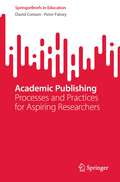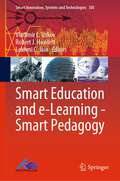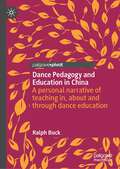- Table View
- List View
Recognizing Green Skills Through Non-formal Learning: A Comparative Study in Asia (Education for Sustainability #5)
by Margarita Pavlova Madhu SinghThis open access book looks into the roles and practices of small and micro-enterprises in formal and informal economies across seven countries and one territory in terms of how they contribute to environmental and sustainable development and green skills promotion. By taking into account the perspectives in these four sectors, catering, automotive, waste management and polyvinyl chloride production, this book maps environmental green practices in the region, identifying mechanisms used to assess existing skills (i.e. knowledge, skills and competencies), and evaluating the potential for green skills inclusion in recognition, validation and accreditation.
Japan’s School Curriculum for the 2020s: Politics, Policy, and Pedagogy (Education in the Asia-Pacific Region: Issues, Concerns and Prospects #67)
by Akito Okada Sam BamkinJapan’s school curriculum, revised for the 2020s, introduces new subjects and, perhaps more importantly, a new vision for teaching referred to as 'active learning'. This book examines the social and political realities that provided space for this unprecedented curriculum reform; the policymaking process through which it was refined; its envisaged pedagogy, and the intended and unintended outcomes of the new requirements, both on the ground in each school subject and across the education system. Finally, the book steps back to consider the possible future of ‘active learning’ and direction of the course of study in this decade and the next. This book will be of interest to those researching contemporary Japanese education, education policy, curriculum studies and equality of educational opportunity.
Handbook of Open, Distance and Digital Education
by Insung Jung Olaf Zawacki-RichterThis open access handbook offers a one-stop-shop for both new and established researchers, educators, policy makers and administrators in the field of open, distance and digital education (ODDE) to gain a comprehensive overview of the history, theory and practice at all levels of ODDE, and at the same time stimulates in-depth discussions on various themes and issues of ODDE for today and future. Researchers, scholars and students in the field of ODDE can use this handbook as a major reference to conduct their own research and learning agendas.To cover the field comprehensively, the handbook is structured following the 3M framework developed by one of the chief editors Zawacki-Richter. The 3M framework categorizes the major research areas and issues in ODDE on three levels. Accordingly, the handbook is divided into six sections in total, two section at each of the three levels: 1) Macro Level – ODDE Systems and Theories, 2) Meso Level - Institutional Perspectives, Management and Organization, and 3) Micro Level – Learning and Teaching in ODDE.This is an open access book.
We Piano Teachers and Our Demons: Socio-psychological Obstacles on the Road to Inspired and Secure Performance (Landscapes: the Arts, Aesthetics, and Education #32)
by Zecharia PlavinThis book focuses on piano teachers and the many pains they encounter in their careers. These pains play an essential role in blocking the musical inspiration of their students. The author identifies with the sensitivities of the teachers, aiming at the inspiration permeated and safer playing of their students.The book penetrates the protective mechanisms of the teachers that, on the one hand, maintain their professional functioning, while on the other hand, block refreshing ideas. It combines exploration of secure and culturally informed inspired playing, coping with exaggerated anxiety and understanding the interaction of piano actions with pianist’s physiology.This book helps to open teachers’ perceptions of the ways to enable more secure and more inspired performances while remembering the inner feelings of the piano teachers.
English Language Teaching: Policy and Practice across the European Union (English Language Teaching: Theory, Research and Pedagogy)
by Lee McCallumThis book provides an overview of current trends and practices in English Language Teaching (ELT) across the European Union. It offers insights into key ELT issues which are at the forefront of twenty-first-century classrooms. It discusses theoretical and empirical work based on topics such as linguistic imperialism, English as a Medium of Instruction, contrastive language analysis, and the interplay between English and the use of countries’ respective native languages. It also explores the challenges of English Language Teaching under different circumstances such as, while using different technological platforms, working with different learner groups (those with Special Educational Needs) and revising traditional practices in grammar and vocabulary teaching. Throughout the book, the link between policy, theory and practice is explicitly highlighted and exemplified. The book is of interest to ELT instructors, course designers, language teachers and teacher trainers, and students enrolled in pre-service English training courses.
English Medium Instruction Practices in Vietnamese Universities: Institutional, Practitioner and Student Perspectives (Education in the Asia-Pacific Region: Issues, Concerns and Prospects #68)
by Min Pham Jenny BarnettThis book focuses on English as a Medium of Instruction practices in higher education in Vietnam, addressing institutional, practitioner and student perspectives. It presents theoretical standpoints and empirical experiences of how institutional policies are enacted in the offering of English as a Medium of Instruction programs in universities in Vietnam, and how the disciplinary content is taught and learned through English. The book showcases the enactment of curricular and pedagogical practices in the classroom, drawing on a range of different disciplines central to university education. It also explores the roles of mother tongues in the construction of disciplinary knowledge in English as a Medium of Instruction programs and courses. This book provides guidance and practical information for university English as a Medium of Instruction policy makers, lecturers and student support teams in English for academic purposes across disciplines, as well as to the theoretical framing of the English as a Medium of Instruction field itself.
The Handbook of Creativity & Innovation in Business: A Comprehensive Toolkit of Theory and Practice for Developing Creative Thinking Skills
by Rouxelle De VilliersThis book enables readers to develop their own creative thinking and their teams' creative problem-solving skills to generate novel, useful and surprising ideas. The vast majority of companies believe that a culture of innovation and renewal impacts performance and ultimately business results. In contrast, many managers feel ill-equipped to promote a culture of creative endeavour for this type of work-environment and lack the know-how to put it into practice. This book covers theory, practice, and impact metrics of both convergent and divergent thinking tools and provide managers with the ideas, tools and guidance to develop a corporate culture conducive to intrapreneurial thinking, idea creation and testing and moving inventions from ideas to viable business concepts, products and profitable innovations. This book includes numerous step-by-step tutorials to help the reader to learn concepts quickly.
The Affective Intensities of Masculinity in Shaping Gendered Experience: From Little Boys, Big Boys Grow
by Amanda KeddieThis book tells a story of masculinity through the experiences of one boy, ‘Adam’. From four different studies and time periods, it tracks moments of significance in his life over a period of 20 years. These moments highlight the ways in which Adam is both drawn towards and away from a hegemonic masculinity of physical toughness, domination, competition and an opposition to ‘the feminine’. The book is set against the backdrop of a long history of contentious gender politics in Australia and globally but particularly responds to the renewed attention to the social construction of masculinities in the current #MeToo climate. Against this backdrop, nuanced and longitudinal accounts of boys’ and men’s experiences of masculinity are significant because they can offer insight into the complex bodily, social, economic, and historical forces that configure masculinities. Such understandings are important in our endeavours as those who educate, support and work with boys and men to transform gender inequalities.
The Inclusion for Students with Special Educational Needs across the Asia Pacific: The Changing Landscape (Advancing Inclusive and Special Education in the Asia-Pacific)
by Wendi Beamish Mantak YuenThis book offers a comprehensive overview of how inclusion for students with special educational needs (SEN) has developed and is continuing to evolve in mainstream schools across the Asia-Pacific region. The authors provide an applied analysis of inclusive education in 10 geographical settings, covering legislative, historical, and cultural perspectives. A diverse range of factors that influence inclusive policy-to-practice implementation in these contexts are highlighted, and practical strategies to address some key issues are put forward. The settings in focus are the Maldives, Singapore, the Republic of Korea, Mainland China, Hong Kong, Macao, Japan, Province of British Columbia Canada, New Zealand, and Australia.
Handbook of Research on Teacher Education: Pedagogical Innovations and Practices in the Middle East
by Myint Swe KhineThis comprehensive book presents emergent findings and promising results in teacher education, curriculum, assessment, teaching and learning approaches, pedagogical innovations and practices, and professional development in educating the next generation of students. The volume reflects the current trends and highlights teacher education programs in all 14 MENA countries in one place. The chapters in this handbook discuss the challenges and the ways to improve teacher education by the educators in the Middle East region, including Bahrain, Egypt, Iran, Iraq, Jordan, Kuwait, Lebanon, Oman, Palestine, Qatar, Saudi Arabia, Syria, Turkey, United Arab Emirates, and Yemen. It also provides an extensive and rich reference for future comparisons across the countries. The book contains chapters written by experienced international teacher educators who draw on their experience and expertise to perennial issues and formidable challenges in teacher preparation and meaningful school reforms. This volume is a valuable resource and essential companion for teacher educators, faculty members, staff developers, trainee teachers, undergraduate and postgraduate students, researchers, school leaders, policy-makers, and professional learning communities to refresh their knowledge and improve their understanding. This book is a must-read for anyone interested in evolving issues in teacher education in the Middle East region.
Service-Learning Capacity Enhancement in Hong Kong Higher Education (Quality of Life in Asia #14)
by Grace Ngai Daniel T. L. ShekThis book provides an in-depth, multi-faceted look into capacity building for service-learning, using the case of the higher education landscape in Hong Kong. Service-learning has been proven to be an effective pedagogy for the holistic development of students, as well as promotion of their well-being. It also attempts to promote the well-being of the service recipients and the community. While service-learning is becoming increasingly popular in many higher educational institutions around the world, the learning gains that can be attained from service-learning are only as good as the learning experience allows, and poorly-developed or motivated service-learning may potentially do adverse harm to students and the community. This book reinforces the imperative to enhance the capacity of the institution, teachers, students and community partners by exploring a diverse range of methods for achieving capacity building among different stakeholders. Examples of the methods explored include formal course-based professional development, scale development, action research, and communities of practice. Furthermore, the book includes a series of detailed, qualitative case studies that are aimed at embodying good practice, unpacking “what matters” from service-learning. Aa a useful resource for scholars and educators who are passionate about holistic youth leadership development, this book is also relevant to researchers in the intersection between well-being and higher education.
Legal Education and Legal Profession During and After COVID-19
by C. Raj Kumar S. G. SreejithThis edited volume records the amazing transformations brought about by leaders in legal education and legal profession. It captures experiences and experiments in the governance of law schools and legal profession during the COVID-19 pandemic as case studies; ideas which helped in resilience and which could show the way forward; the psychological, philosophical, and sociological aspects of the transformation; and the spiritual and material sources of motivation of the leadership. The contributions are along the following themes --- The shifting idea of law school: systems and processes; The “new normal” in legal profession; Psychological, philosophical, and sociological aspects of transformation; Experiences from global regions and countries; Legal education and legal profession in a post-COVID world. Through these five themes, and the eighteen contributions, the volume seeks to answer questions like --- how the educational and professional leaders adapted to the circumstances by building a “new normal”? How and to what extent their own legal education and professional experiences informed their actions during the Pandemic? How they re-imagined ambitions and reordered systems and processes? What type of guidance and support they received from the state and regulatory bodies? How they guaranteed the well-being of students, faculty, and staff during the Pandemic and the transition? How they upheld professional values and ethics when contexts of their application collapsed?
Concepts and Practices of STEM Education in Asia
by May May Hung Cheng Cathy Buntting Alister JonesThe purpose of this edited book is to enrich the literature related to STEM education at kindergarten, primary and secondary levels in Asia, with particular attention given to the analysis of the educational context in a number of Asian countries, including STEM-related policies, pedagogical practices, and the design and evaluation of STEM programmes. The discussions look into impacts on student learning outcomes and the ways in which STEM education is catering for schools and students’ interests and needs. The contributors are experts in STEM education or are leading major research and development projects in STEM in their regions. The book’s first section is focused at the macro-level on the conceptualization and formulation of STEM education policies in different regions, contributing to our understanding of the current status of STEM education in Asia. The second section examines some features of STEM learning and teaching at the classroom level and includes studies on student learning in STEM programmes. Pedagogical innovations implemented in different parts of Asia are also reported and discussed. The third section moves to teacher education and teacher professional development. It discusses practices of teacher professional development in the region and reports on current provisions as well as challenges. Together, the contributions from different Asian regions invite researchers and educators to learn from effective STEM practices, and point out areas for further development.Chapters "An Overview of STEM Education in Asia" and "STEM Teacher Professional Development for Primary School Teachers in Hong Kong" are available open access under a CC BY 4.0 license at link.springer.com.
Application-Oriented Higher Education: A Comparative Study between Germany and China (East-West Crosscurrents in Higher Education)
by Ye Zhang Xinrong ChenThis book investigates the higher education system in Germany and China, and analyzes the differences between academic higher education and application-oriented higher education. It explores the past, present, and future of application-oriented higher education in these two countries, and discusses the advantages and disadvantages of this type of education. Using multiple data collection methods across case studies and student questionnaires, it demonstrates the necessity of a dual track higher education system based on separate entrance test and admission system to tertiary-level education, which ensures that students have transitional options. Further, it highlights the improvement of teaching quality and student satisfaction with application-oriented higher education and concludes that the international perspectives from higher education should be considered as one of the most significant methods of educational strategies.
Design Praxiology and Phenomenology: Understanding Ways of Knowing through Inventive Practices
by Lynde Tan Beaumie KimThis book offers insight into designerly ways of knowing from the perspectives of experts and professionals engaging in diverse forms of design in workplaces and other public domains. It also aids in the understanding of design practices from designers’ viewpoints via case studies. By pursuing a reflective inquiry in their design epistemology (designerly ways of knowing), design praxiology (practices of design), or design phenomenology (forms of designs), self-studies of design practices, and presenting studies of designs, the authors of this book demonstrate how they influence the people and the object of inquiry or design. The case studies presented in this book also illustrate how designers develop their expertise, and provides inspiration for the incorporation of design-thinking and practice in education.
STEM Education in the Early Years: Thinking About Tomorrow
by Kevin Larkin Thomas LowrieThis book analyses and synthesises past and current approaches to STEM Education in the Early Years, particularly the role of digital technologies and play based pedagogies, and provides a look forward to a new way of conceiving STEM Education. It presents a literature review of existing best practice in STEM education, both in Australia and internationally. It also presents theoretical and pedagogical discussions that outlines a new approach to STEM Education, based on a four-year, longitudinal, Early Years project. It provides educational frameworks for educators' use to enhance student learning in STEM, both in formal school contexts and beyond. This book focuses on a number of core themes in the research literature, including STEM education policy (nationally and internationally); the economic, social and political implication of STEM Education; the nexus between digital technologies, STEM, and play based pedagogies; the confidence and competence of early childhood educators and their professional development requirements; STEM education beyond formal schooling; and a new pedagogical approach to STEM education.
Reconstructing the Work of Teacher Educators: Finding Spaces in Policy Through Agentic Approaches —Insights from a Research Collective
by Theresa Bourke Deborah Henderson Rebecca Spooner-Lane Simone WhiteThis book examines agentic approaches by which teacher educators navigate a highly regulated environment. It investigates how teacher educators are responding to such regulation by employing approaches such as exploratory and case study research designs. This book analyzes qualitative and quantitative data to understand the diverse, innovative and critical perspectives of teacher educators who are guided by state and federal level initiatives to enhance the quality Initial Teacher Education (ITE) programs. Prominent educational theoretical perspectives are also used in this book to inform data analysis and to illuminate the empirically based findings.This book showcases research-informed insights for the global education community from leading researchers from across a number of teacher education institutions, locally and otherwise. By adopting an ‘activist’ approach, this book positions teacher educators’ research and contribution to the field as agentive and pro-active.
Conflict, Culture and Identity in GP Training
by Jennifer L. JohnstonThis book explores the identity work and conflicted perspectives of general practitioner (GP) trainees working in hospitals in the UK. Drawing on empirical and theoretical scholarship, and privileging the analysis of social language-in-use, Johnston describes primary care medicine as a separate paradigm with its own philosophy, identity and practice. Casting primary and secondary care in historical conflict, the perceived lower status of primary care in the world of medicine is explored. Significant identity challenges ensue for GP trainees positioned at the coalface of conflict. Problematising structures of GP training and highlighting how complex historical power dynamics play out in medical training, the author advocates for radical change in how GPs are trained in order to manage the current primary care recruitment and retention crisis.
Regional Inequality and Development: Measurement and Applications in Indonesia (New Frontiers in Regional Science: Asian Perspectives #63)
by Takahiro Akita Mitsuhiko KataokaThis book addresses three main issues in regional income inequality and development: meaning of regional inequality, measurement of regional inequality and the relationship between national economic development and regional income inequality. It provides analytical methods useful in exploring the determinants of regional inequality in income and productivity. Some software commands in Stata (statistical software package) available for the measurement and analysis of income inequality are also introduced. Some researchers have argued that spatial concentration of population in and around major cities and the concurrent increase in regional inequality do not hinder national economic development, and may stimulate it. Nevertheless, many national governments seek to promote balanced regional economic development and reduce regional income inequality, because unbalanced development and higher levels of regional inequality may cause political or ethnic conflicts between different regions of the country. As the applications of the analytical methods introduced in the first part of the book, the second part presents four independent empirical studies on regional inequality and development in Indonesia. They offer very interesting case studies for the formulation of policies and programs to reduce regional inequalities, because as the world’s largest archipelagic country with more than 13 thousand islands and 300 ethnic groups, Indonesia is spatially diverse in terms of its ecology, natural resource endowments, economy, ethnicity and culture.This book can be used as a textbook for undergraduate and graduate students who are interested in national economic development and regional income inequality. It is also beneficial for practitioners and policy makers who are in charge of the formulation, implementation and evaluation of development policies and programs.
L. S. Vygotsky's Pedological Works, Volume 3: Pedology of the Adolescent I: Pedology in the Transitional Age (Perspectives in Cultural-Historical Research #11)
by L. S. VygotskyThis book contains the first complete translation of the first half of the Pedology of the Adolescent by the Soviet thinker, educator, and teacher L.S. Vygotsky. It was the longest work published in his lifetime and was a correspondence course written by Vygotsky for teachers across the Soviet Union. The book is a sustained argument about the borders of pedology, the nature of the transition between childhood and adulthood, and the concrete character of the distinction between the lower psychological functions that we largely share with animals and those that are specific to fully socialized humans. After an initial methodological introduction, three kinds of maturation—general anatomical, sexual, and sociocultural—are explored. This book will be followed by a companion volume covering pedology of the transitional age as a psychological and social problem.
Managing the Post-Colony South Asia Focus: Ways of Organising, Managing and Living (Managing the Post-Colony)
by Nimruji Jammulamadaka Shoaib Ul-HaqThis edited book on South Asia is part of the book series “Managing the Post-colony.” This series is co-edited by Nimruji Jammulamadaka and Gavin Jack and is focused on managing and organising within the historical and contemporary structures of colonization and imperialism within and across nation-states and social domains especially the economic and the cultural domain. This edited book on South Asia is committed to a presentation of indigenous understandings and knowledge around the organizing, religion, language and cultural production through the lens of anti, post and de-colonial thought. This book forces the reader to consider not just what we know but how and where we know and can be instrumental in identifying and challenging dominant modes of management knowledge production. The decolonial movement is closely associated with scholars like Walter Mignolo, Anibal Quijano and others who expose how Western rationality and science, emanating from the enlightenment project, are being used by colonial powers to consolidate their imperial projects. The authors in this book argue that a potent form of colonization is epistemic in nature. This book series seeks to present cutting-edge, critical, interdisciplinary, and geographically and culturally diverse perspectives on the contemporary nature, experience and theorization of managing and organizing in post-colonial location under conditions of coloniality. These conditions subsume ongoing and new forms of colonisation/imperialism, and complex resistances to them, and lives lived outside them, and may be drawn out and investigated in regard to a multiplicity of different business- and management-related topics.The power of domination is its ability to silence other ways of knowing, being and doing. Focus on South Asia: Ways of Managing, Organising and Living delivers a profound critique of Western management theory and its universalistic claims. But, it goes much further to advance other managements and ways of organising from the peoples and communities of South Asia. Stella M. Nkomo, University of Pretoria, South Africa I like very much the orientation and the composition of the volume…you have a) the meaning of management in the West changed after the Industrial revolution and by 1900 became a political issue domestically in the US and before that colonial, as you show in the colonial context of South Asia; b) so the constitution of the settler management as you show with McCaulay, destituted all existing local form of organizing their praxis of living; c) the task now is the reconstitution of the destituted, the pluriversal human (and animals too) self-organization subjected to Western regulations to their own benefit, while materializing their rhetoric of racial destitution (incapable of organizing like us, impossible for them to be like, us we have to teach them civilization, etc.). Walter Mignolo, William H. Wannamaker Professor of Literature and Romance Studies at Duke University, USA Very Impressive and Much Needed Pushkala Prasad, Zankel Chair Professor, Skidmore College.
Creative Industries and Digital Transformation in China
by Sabine Chrétien-Ichikawa Karolina PawlikAs China gains momentum in economic terms, its technological transformation, cultural confidence, and creative influence also grow steadily. This book explores socio-cultural context, in which new trends, enabled by the power of digital technology, emerge. Focused on the urban context, in China's large cities like Shanghai, and through the lens of art, design, fashion, gaming, and media industries, this book highlights innovation processes in the making, as well as ongoing shifts in Chinese identities and narratives. This collaborative work written by European authors based in China offer new insights from within. Their shared, yet multi-faceted, engagement with China and its creative industries culminates in this book written for international scholars, students, and industry players.
Academic Publishing: Processes and Practices for Aspiring Researchers (SpringerBriefs in Education)
by David Coniam Peter FalveyThis book focuses on the topic of academic publishing. It discusses the mounting, serious problems that researchers, particularly new researchers, encounter when trying to publish their research. The book addresses the issues of publishing as well as the salient factors militating against academic publication and the mitigating factors encouraging academic publication. It provides potential solutions, suggestions, and strategies for overcoming some of these problems. Growing research output from Southeast Asia including Singapore, Malaysia, Taiwan, and China reveals the struggles that many authors have to confront when attempting to publish their work in reputable journals. In both South Africa and other parts of Africa, academic researchers are beginning to show strong evidence of credible academic output. These researchers all need valid outlets for their work and the security that authentic peer review brings to the reviewing process. In the fields of education, social sciences, and professional practices, e.g., architecture and law, recent years have seen the emergence of new outlets for practitioners’ research outputs in areas such as one’s own practice, self-reflection, and narrative inquiry. These outlets are discussed in this book. The book also discusses the malign influence of predatory publications in detail. This book will be beneficial to university academics, postgraduate students, Ph.D. supervisors, and new researchers.
Smart Education and e-Learning - Smart Pedagogy (Smart Innovation, Systems and Technologies #305)
by Vladimir L. Uskov Robert J. Howlett Lakhmi C. JainThis book serves as a reference for researchers and practitioners in academia and industry. Smart education, smart e-learning and smart pedagogy are emerging and rapidly growing areas that have a potential to transform existing teaching strategies, learning environments and educational activities and technology. They are focused at enabling instructors to develop innovative ways of achieving excellence in teaching in highly technological smart university and providing students with new opportunities to maximize their success using smart classrooms, smart systems and technology. This book contains the contributions presented at the 9th international KES conference on Smart Education and e-Learning (SEEL-2022) with the Smart Pedagogy as the main conference theme. It comprises of forty nine high-quality peer-reviewed papers that are grouped into several interconnected parts: Part 1—Smart Pedagogy, Part 2—Smart Education, Part 3—Smart e-Learning, Part 4—Smart University, Part 5—Smart Education: Systems and Technology, Part 6—Digital Humanities and Social Sciences for Smart University Development: the Innovative Methods, Models and Technologies, Part 7—Digital Transformation of Education and Economics in Smart University and Part 8—Smart Education for Children with Special Educational Needs. We believe this book will serve as a useful source of research data and valuable information for faculty, scholars, Ph.D. students, administrators and practitioners—those who are interested in smart education, smart e-learning and smart pedagogy.
Dance Pedagogy and Education in China: A personal narrative of teaching in, about and through dance education
by Ralph BuckThis pivot offers an innovative approach to dance education, bringing a creative and inclusive dance education pedagogy into Chinese dance classrooms. Associate Professor Ralph Buck’s experiences of teaching dance at the Beijing Dance Academy and the possible implications for dance education in China lie at the heart of this text. Through a critical examination of personal teaching practice, pedagogical issues, trends and rationales for dance education in the curriculum are highlighted. Informed by constructivist ideals that recognise dialogue and interaction, this pivot suggests that dance can be re-positioned and valued within educational contexts when pedagogical strategies and objectives are framed in terms of teaching and learning in, about and through dance education.
